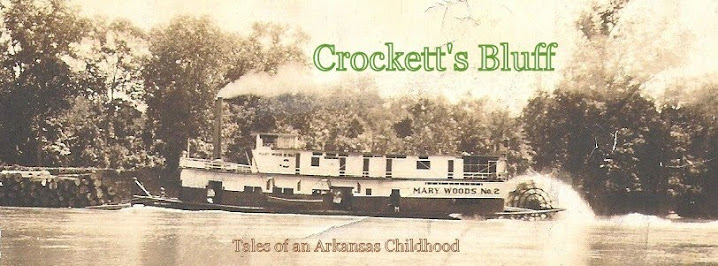
In his memoir Crocketts Bluff As I Remember It David Prange recalls his experiences as a youthful witness of Negro baptisms that usually took place at Voss Lake, about a mile or so west of the Bluff. Unlike the baptisms he recalls at his family's Bethlehem Lutheran Church located slightly north of his family's store at the entrance to the lane leading up to the Woodiel home site, the ceremonies at the lake were carried out not ritualistically within a church itself but outdoors in natural water deep enough for total submersion -- just like that of Jesus by John the Baptist, according to their reading of the scriptures. And so it was with the local -- all white -- Baptists in the Bluff whose church was attended by my family.
Like most pictures, the one above captures a moment in time. A moment shortly before a group of people, here crudely encircled in the Prange irrigation canal in Crocketts Bluff, are to be baptised -- that is, dunked backward beneath the surface of the water by the country preacher to emerge as new members of the local Baptist Church. The ceremony marks the end of a summer "revival," a series of nightly meetings whose purpose was, along with renewing the spiritual intensity of the faithful, to bring the "lost" to salvation.
How strange are all of these terms to me today -- revival, baptism, salvation. So commonplace in my youth, but today strangely absurd.
I am one of the people captured in this picture. I appear to be about fourteen. The dark-haired figure in the right foreground is "Brother" (we didn't call the minister Reverend, as I recall) Monroe Davis, and I, not quite like Athena from Zeus, appear to be rising out of his head.
My memory of this occasion remains vague and faint, but I clearly recognize in addition to Brother Davis several personalities significant to me at the time: Russell Marrs, Earl Gammon, and (I believe) Glenn Widener -- all people whom I admired and respected and for whom I worked either with or for over those years. I think I learned more from Russell Marrs than from any adult in my youth other than perhaps Charles Downs, the Principal of St. Charles High School during my years there.
In his "remembrance" David includes his recollection of joining others in attempting to disrupt the ceremony of the Negro baptism as a belated confession, confident that God has forgiven him for his youthful indiscretions.
All the witnesses along the bank of the canal pictured here, apparently almost directly across the road from Schwab's Store, appear to be most orderly and respectful, even curious. When I look at them I try to recall not just what I might have been feeling and thinking at the time but what it all might have meant to me. What I glean, however, is more imagination and fantasy than recollection.
It occurs to me, however, that it was not far down the canal near a noteworthy sycamore tree from whose limbs local swimmers loved to dive, that some years earlier I had learned to swim after having been tossed into the canal by my older brothers. When I arose frantically to the surface that afternoon I did what I had to do -- frantically "dog-paddle" to the shallow water.
Rites of passage. Essential and unavoidable and valued to one's last day, regardless. Perhaps in ritual captured on this Sunday afternoon I was once again doing what I felt I had to do.
